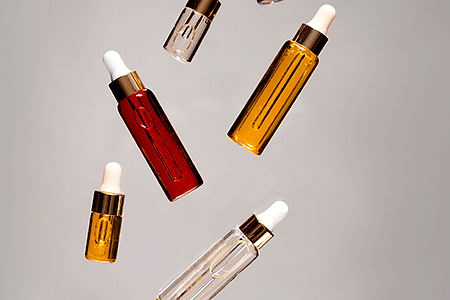Retinoid or retinol?
Tips for when to use these skin care powerhouses
Retinoids and retinol can be found in products stocked up and down most skin care aisles, but do you really understand the difference and how to use each?
Retinoids are not a fad
While it may seem like the latest must-have ingredient of the moment, a type of retinoid was approved by the U.S. Food and Drug Administration for use as a topical acne treatment back in 1971. It was tretinoin, which prevents pores from clogging, as well as reduces and prevents acne scars.
It didn’t take long for dermatologists and their patients to notice that this retinoid had potent anti-aging properties. As it spurs faster turnover of surface skin cells and boosts collagen, it also improves skin tone and reduces fine lines and wrinkles.
Today, the term "retinoids" is a catch-all for an array of vitamin A-based products used on skin. For acne treatment, adapalene comes in both prescription and over-the-counter formulations; tretinoin, tazarotene, and trifarotene are topical formulations available by prescription for acne, and isotretinoin is an oral medication available by prescription only for severe acne.
Then there’s retinol, a type of retinoid that’s routinely used to improve uneven skin tone, pigmentation, and texture. It is available over the counter in a dizzying array of products.
A board-certified dermatologist can help you decide if retinoids are right for your skin.
Is a retinoid the right choice?
A skin product that contains retinoids is a good option for someone with mild acne, mild pigmentation irregularities, or mild fine lines and wrinkles.

Is a retinoid the right choice?
People who have skin allergies or dryness are probably not good candidates for a product that contains a retinoid. "If someone has a lot of redness or inflammation in their skin, they should avoid retinoids and ask their dermatologist about other therapies that are more directed to a condition called rosacea," says Anne Chapas, MD, FAAD, a board-certified dermatologist in private practice in Manhattan. "Also, people who have moderate or severe acne scarring, or whose acne is associated with their menstrual periods or other hormonal changes such as hair growth, should really see a board-certified dermatologist before they try a retinoid." Retinoids should not be used during pregnancy.
While people of all skin colors can benefit from retinoids, people with darker skin need to be especially vigilant about whether a product is causing irritation, says Sonia Badreshia-Bansal, MD, FAAD, a board-certified dermatologist in private practice in Danville, California. "With skin of color, irritation can trigger dark marks, known as hyperpigmentation," she cautions. "However, starting slowly and using moisturizer will help mitigate this possibility."
A skin product that contains retinoids is a good option for someone with mild acne, mild pigmentation irregularities, or mild fine lines and wrinkles, says Tina Alster, MD, FAAD, a board-certified dermatologist and clinical professor of dermatology at Georgetown University Medical Center in Washington, D.C. "Many patients want to start right off with tretinoin, but I advise them to use the least-intense retinoid formula they can find, and use it every other night to start, slowly building up," she says. "If they don’t do that, they end up irritating their skin."
Because retinoids can make skin more sensitive to sun, Dr. Alster advises using it only at night and always using sun protection during the day, which includes seeking shade, wearing sun-protective clothing, such as a wide-brimmed hat, and applying sunscreen to all skin not covered by clothing. If you have sensitive skin, look for a physical sunscreen containing the ingredients titanium dioxide and/or zinc oxide.
The trick is figuring out which retinoid product to try, given that there are so many options available. "For over-the counter products, there’s no standard requirement that the percentage of retinol be disclosed on the label or packaging," says Dr. Chapas. Use the lowest formulation you can find, she advises.
Bottom line: If you’re considering using a retinol product, talk to your dermatologist to see if it would be a good option for your skin.
Related AAD resources
Last updated: 5/25/21
 Atopic dermatitis: More FDA-approved treatments
Atopic dermatitis: More FDA-approved treatments
 Biosimilars: 14 FAQs
Biosimilars: 14 FAQs
 How to trim your nails
How to trim your nails
 Relieve uncontrollably itchy skin
Relieve uncontrollably itchy skin
 Fade dark spots
Fade dark spots
 Untreatable razor bumps or acne?
Untreatable razor bumps or acne?
 Tattoo removal
Tattoo removal
 Scar treatment
Scar treatment
 Free materials to help raise skin cancer awareness
Free materials to help raise skin cancer awareness
 Dermatologist-approved lesson plans, activities you can use
Dermatologist-approved lesson plans, activities you can use
 Find a Dermatologist
Find a Dermatologist
 What is a dermatologist?
What is a dermatologist?